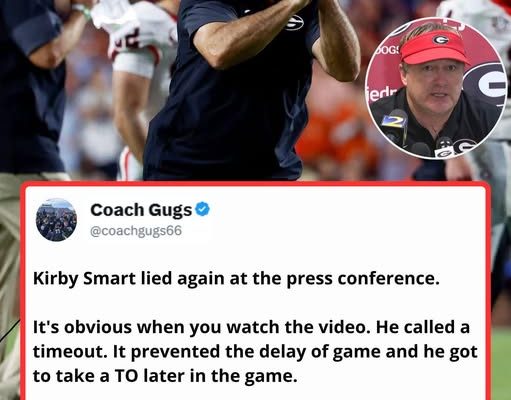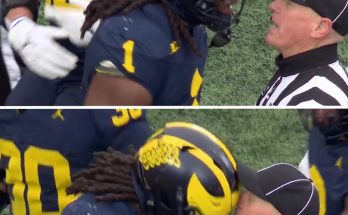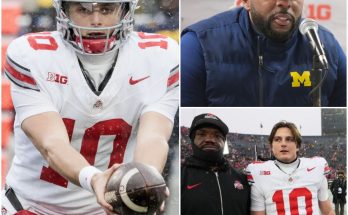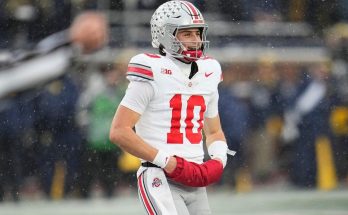The college football world was sent into a frenzy this weekend after Georgia Bulldogs head coach Kirby Smart’s postgame press conference ignited a wave of outrage among fans, analysts, and even former players. The controversy centers on a crucial moment late in Georgia’s dramatic clash against Tennessee — a sequence that fans insist shows Smart clearly calling for a timeout, despite his insistence afterward that he didn’t.
The play in question occurred with less than two minutes remaining, as Georgia clung to a narrow lead. Tennessee was mounting one final drive, and chaos unfolded on the field when a substitution error appeared to leave the Bulldogs scrambling on defense. On the broadcast, cameras captured Smart sprinting toward the sideline referee, signaling with both hands — a motion that looked unmistakably like a timeout request. The referees, however, allowed the play to continue. The Volunteers snapped the ball, and the result was a controversial completion that gave them a fresh set of downs.
After the game, when asked about the sequence, Smart firmly denied calling for a timeout. “No, I didn’t call one,” he told reporters, his tone defensive yet calm. “We were trying to get our guys aligned. I was just communicating with the sideline official about the substitution, that’s it.”
But fans watching at home weren’t buying it. Within minutes, social media exploded with slow-motion replays and zoomed-in clips from multiple angles showing Smart’s gestures — hands forming the classic “T” shape coaches make when calling for a timeout. Comments flooded X (formerly Twitter), Instagram, and Reddit, calling out what many viewed as blatant dishonesty from the Georgia head coach.
“Kirby Smart flat-out lied,” one fan wrote in a viral post that garnered over 20,000 likes in under an hour. “He called timeout. The video is crystal clear. The refs ignored it, but instead of owning it, he’s pretending it didn’t happen. Unreal.”
Another fan added, “If players get fined for taunting or unsportsmanlike behavior, coaches should get fined for lying in pressers. This is embarrassing.”
By Sunday morning, the hashtag #TimeoutGate was trending across college football social media, with fans dissecting the footage frame by frame. Sports talk shows ran the clip on loop, analysts debated the intent behind Smart’s motion, and national commentators weighed in on the ethics of coaching transparency.
Paul Finebaum, known for his sharp takes on SEC controversies, didn’t mince words during his Sunday morning segment. “Look, Kirby Smart is one of the best in the game — no one’s questioning his brilliance,” Finebaum said. “But you can’t go on live television, deny something that’s on tape, and expect people to just shrug it off. Fans aren’t dumb. They saw what happened. He called for timeout — plain as day.”
Others, however, came to Smart’s defense, arguing that the gesture could easily have been misinterpreted. Some analysts suggested that Smart’s movement toward the sideline official was simply an urgent attempt to draw attention to a substitution mismatch, not necessarily a timeout request. “Coaches wave their arms all the time,” one ESPN commentator said. “It’s an emotional, chaotic moment. Unless we hear the audio of what he said, we can’t assume intent.”
But even that nuance did little to calm the outrage brewing among Georgia’s own fanbase. On message boards and Facebook groups, Bulldog supporters expressed deep frustration — not necessarily about the play itself, but about what they perceived as Smart’s refusal to take accountability.
“This isn’t about the timeout anymore,” a longtime season ticket holder wrote. “It’s about honesty. Fans respect Kirby because he’s usually straightforward. But watching him deny something that’s on camera felt like a slap in the face.”
By late Sunday evening, several former Georgia players had chimed in. One, who requested anonymity, told a local Athens reporter: “Kirby’s a competitor. He hates losing control of a situation. But he also knows the cameras are everywhere. He probably regrets saying that in the presser.”
The incident has reignited an ongoing debate about the role of transparency in college football. In an era where every sideline move is captured in 4K and dissected across social media, fans expect coaches to own up to their actions. Gone are the days when a coach could simply deflect or downplay a controversial moment without immediate backlash.
Moreover, the controversy underscores the growing scrutiny placed on SEC officiating — a hot-button issue in nearly every major matchup. Fans have accused referees of inconsistency all season, and this latest episode has only added fuel to the fire. “The refs missed it, plain and simple,” one former referee commented online. “If Kirby was signaling for timeout and they ignored it, that’s on the officiating crew. But if he’s denying it afterward, that’s on him. Both sides failed here.”
Some fans even began calling for formal accountability measures, suggesting the SEC fine or reprimand coaches who misrepresent key in-game moments. “If players can be penalized for honesty lapses on social media, why shouldn’t coaches be held to the same standard?” one post read.
While fines are rare in college football — especially for something like this — the outrage is a reminder that the relationship between coaches and fan bases is built on trust as much as performance. Kirby Smart, who has led Georgia to multiple national championships and built a dynasty in Athens, has long been seen as one of the sport’s most disciplined and transparent figures. That’s precisely why this controversy has struck such a chord.
“People hold Kirby to a higher standard,” said one former Bulldog captain in an interview with The Athletic. “When you’ve built a culture around accountability, fans expect that from the top down. So even a small lie, or what seems like one, feels huge.”
Adding another layer to the debate, Tennessee fans have gleefully seized on the controversy, using it to poke fun at their long-time SEC rival. Memes depicting Smart holding a giant “T” for timeout spread quickly online, with captions like “Kirby’s New Play Call” and “Timeout? What Timeout?” flooding social media feeds.
Meanwhile, some neutral observers see the entire episode as overblown. “We’re in a world where every gesture gets turned into a scandal,” one college football columnist wrote. “Smart’s job in that moment was to manage chaos. Maybe he tried to call timeout, maybe he didn’t. Either way, Georgia won the game. This is sports drama at its most exaggerated.”
But the uproar hasn’t quieted. Monday morning, ESPN’s “Get Up” devoted a full segment to the incident, looping the slow-motion footage as analysts debated whether Smart’s denial was a simple misunderstanding or an outright falsehood. The video clearly showed his right hand forming the traditional timeout symbol — a detail difficult to dispute.
By mid-afternoon, a Georgia spokesperson issued a brief statement attempting to diffuse the situation: “Coach Smart has addressed the matter. There was confusion on the sideline during a fast-moving situation, and the officials made their call. We are fully focused on preparing for next week’s game.”
The statement did little to quell public reaction. Critics accused the program of trying to sweep the issue under the rug rather than acknowledge it directly. “If Kirby had just said, ‘Yeah, I called timeout, but the refs missed it,’ this wouldn’t even be a story,” one national reporter noted. “The cover-up always creates more backlash than the act itself.”
Indeed, the situation has become a microcosm of modern sports culture — where perception often matters more than the actual outcome. Fans expect their heroes to not only win, but to embody integrity in every word and action. When that expectation isn’t met, even the smallest denial can snowball into a public relations nightmare.
For Smart, the timing couldn’t be worse. Georgia sits atop the SEC standings, eyeing another playoff run, and distractions like this can quickly shift focus. Inside sources suggest the team is brushing it off, treating the uproar as outside noise. But behind the scenes, there’s likely an awareness that every word from the head coach now carries magnified weight.
Still, some fans have begun softening their stance, acknowledging that the intensity of game-day emotions can cloud judgment — for coaches and spectators alike. “Kirby’s human,” one Georgia alum wrote. “Maybe he really thought he didn’t call timeout. Maybe in the chaos, he forgot he did. Let’s give the man a little grace.”
That sentiment, however, remains a minority. For now, the outrage continues, and the video keeps circulating — each replay reigniting the debate over what exactly Smart was doing in that fateful moment.
At the heart of the matter lies a simple truth: college football isn’t just about the scoreboard anymore. It’s about the stories, the optics, and the accountability that come with a multimillion-dollar enterprise watched by millions. In that ecosystem, even a few seconds of sideline confusion can balloon into a national controversy.
Whether Kirby Smart meant to call timeout or not may never truly be settled to everyone’s satisfaction. But what’s undeniable is how quickly trust can fracture in the glare of modern sports media. In an age of endless replays and fan-driven analysis, no gesture goes unnoticed — and no denial goes unchallenged.
As the Bulldogs prepare for their next opponent, one thing is certain: the cameras will be watching Kirby Smart even more closely. Every motion, every interaction with referees, every sideline outburst will be parsed for meaning.
For a coach who has built his legacy on discipline, honesty, and control, the “TimeoutGate” saga serves as a stark reminder that in today’s game, perception is as powerful as performance. And for fans who feel deceived, forgiveness won’t come until the man at the center of it all — whether by clarification, admission, or silence — finds a way to restore their trust.
Until then, the chant echoing through college football social media remains the same:
“He lied — the timeout was clear on video, and he should be fined.”



